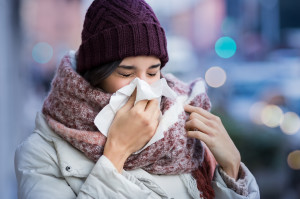
Sharing is caring around the holidays—except when it comes to cold and flu germs. The sounds of sneezing and sniffling may be familiar during the winter months, but how do you know if you or those around you are battling the common cold, or another illness like the flu? While the common cold and the flu are both contagious respiratory illnesses and have similar symptoms, they are caused by different viruses and are treated differently.
Symptoms of a Cold
Cold symptoms will come on gradually, over the course of a few days—you’ll usually know you’re about to start feeling sick. Fevers are rare with colds, but they can happen. Sneezes, stuffy noses, and sore throats are very common cold symptoms, with coughing and chest discomfort occasionally being present. Aches, pains and chills are uncommon with the cold—symptoms usually limit themselves to sinuses and the occasional headache. Colds are milder than the flu, and symptoms usually resolve themselves in a few days or are treated with over the counter medications.
Symptoms of the Flu
While cold symptoms will gradually affect you, flu symptoms will come on abruptly—maybe even overnight. Fever is a major symptom of the flu, but not everyone with the flu will have a fever. Chills, aches and fatigues are usual symptoms of the flu, along with occasional vomiting and diarrhea. Coughing, sore throats and stuffy noses can sometimes accompany other flu symptoms. The flu is generally severe and can cause serious complications like pneumonia.
Anyone can get a cold, and even the flu (even healthy people), but some groups are at a higher risk of developing flu-related complications—including older people, pregnant women, children and people of any age with certain medical conditions. You can get the flu or a cold at any time of the year, but the viruses that cause these illnesses usually do the most damage in the winter months. If you’re diagnosed with the flu, you’ll receive antiviral drugs that can prevent complications, lessen your symptoms and shorten the time that you’re sick.
Common hygiene practices are always a good idea to prevent the spread of illnesses, but the best way to prevent the flu is to get an annual flu vaccine. Pharmacies will offer these shots at a reduced rate and some organizations may offer them free of charge. The common cold is common for a reason—it’s hard to prevent. Washing your hands frequently, avoiding eating or drinking after others and covering your mouth when you cough or sneeze may be your best line of defense against this wintertime sickness staple.
Disclaimer: The contents of this article, including text and images, are for informational purposes only and do not constitute a medical service. Always seek the advice of a physician or other qualified health professional for medical advice, diagnosis, and treatment.









Natural herbs are truly the remedy for HSV-1&2 and Dr Osato herbal medicine cures HSV within two weeks. I just tested Negative for HSV-2 after using Dr Osato herbal meds for two weeks and i am totaly free from HSV. To place an order and get yours today visit his website https://osatoherbalcure.wordpress.com or email him at osatoherbalcure@gmail.com
Reply